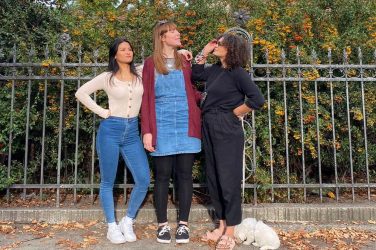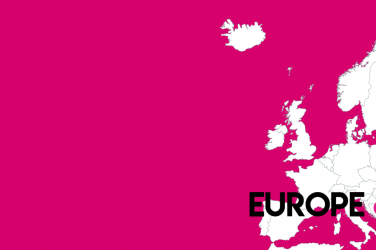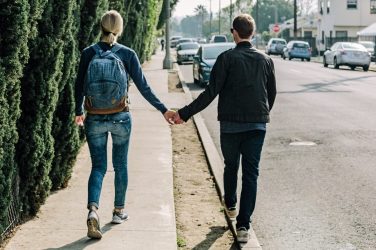The following is a personal testimony and reflection by E&M author Clé on recent developments in the United States, her own experience with orphanhood, pregnancy and abortion, and the importance of not being complacent in the defense of gender and reproductive rights in Europe.
While women and people with uteruses’ rights to decide over their bodies should be enough to justify the secure right to abortion, the Dobbs vs. Jackson Women’s Health Organization decision not only condemns thousands of people’s lives, but also the lives of future children the Supreme Court of the United States (SCOTUS) pretends to protect.
As an orphan, I can testify of how painful and difficult it is to evolve into a healthy adult when you experienced neglect and abuse as a child, without a stable caretaker.
My father died when I was 9 years old, and my mother abandoned me when I was 7 — she retained visiting rights in my early teenage years and regained full custody for 2.5 years slightly later, then kicked me out while I was still a minor. This makes me both an orphan, having lost my father below 18 years of age, and a social orphan, having my mother failing to fulfill her parental obligations while being alive.
Unintended Pregnancy and the Experience of Orphanhood
Losing a parent as a child is profoundly traumatic. The loss of my father was further aggravated as my mother abandoned, neglected, and abused me — mostly psychologically, but also physically.
My mother was not ready to be one, for various reasons I will not disclose here. I do not blame her for anything she did or did not do, nor for the way she became. Having a child takes desire, passion, and sacrifices that not everyone is ready nor should be expected to be ready for.
Forcing pregnancy and childbirth upon people is insanity when evidence suggests that unintended pregnancy is considered a predictor of child maltreatment — physical and psychological. Not all those forced into parenthood will automatically become terrible parents — nor will all intended pregnancies result in exemplary ones (I was born out of an intended pregnancy myself). However, the risk is significant and increases when considering other policies harmful to families.
Having a child takes desire, passion, and sacrifices that not everyone is ready nor should be expected to be ready for.
For one, states planning to ban abortion do not provide paid family leave, universal healthcare, and affordable childcare — which aggravates the financial stability and other risks faced by single mothers. However, evidence suggests a strong probabilistic relationship between financial hardship and child neglect, and sometimes maltreatment — which may also result in out-of-home care for children.
Second, while US Federal Antipoverty Programs and Policies exist and suggest a will to improve children’s lives and alleviate poverty, its effectiveness regarding the safe and consistent children’s care is questionable. This is due to a lack of recognition of financial hardship as a causal mechanism of neglect and to federal policy which purposefully omits alleviation of poverty as a solution to the occurrence of neglect.
Child abuse and neglect has serious consequences on children’s health and long-term social integration.
This includes an increase in vulnerability toward mood disorders and pernicious disease course, including post-traumatic stress disorder, depression, anxiety, suicide attempts, and substance abuse. I have experienced all of the above repeatedly since before I was even a teenager. Because of child abuse and neglect, and the lack of a stable caretaker, I grew up feeling worthless, unlovable, and utterly useless — and I still sometimes feel this way. It took me over a decade of therapy, hard work, motivation, and a lot of luck to go and stay on the right path — which I wouldn’t have managed without my grandparents, friends, and teachers who never failed me.
The Consequences of Institutional Care
But not everyone is as lucky as I was to recover, avoid foster care, and be able to rely on an extended kinship network in order to grow up and pursue a relatively normal life. When I had to go to court with my grandmother — as I was under her custody — for updates on our family situation, my biggest fear was to end up in a foster care institution.
My own half-brother from a different father was separated from our mother when he was 3, as his parents split. We both witnessed domestic violence when they were together. He was sent to foster care by his equally abusive father when he was 14.
Foster care services and child institutionalisation is generally associated with lasting negative developmental outcomes — in terms of physical growth, cognition, socio-emotional development, and mental health. I can see how profoundly this has impacted him and negatively affected his access to well-being and a wide range of opportunities.
As a child, I sometimes wondered why my mother did not abort me instead of abandoning, neglecting, and abusing me the way she did.
He suffered from fighting with other fostered children, from loneliness due to being separated from his few supporting family members (including myself), from feeling unwelcomed by his foster families, and from unsolicited sexual requests. There may be more traumatic stories I do not know about. He is now 19 and attempting to process everything that has happened to him. Meanwhile, he is struggling to obtain his high-school degree for various reasons, including that he is working up to 60 hours a week for Uber Eats, since he no longer receives state support and hardly anyone’s help to survive.
Now the question is: Do we really want more children who come into this world to experience this? Is the risk of having unintended pregnancies resulting in increased child abuse and institutionalisation, with all associated suffering and developmental issues, worth taking?
As a child, I sometimes wondered why my mother did not abort me instead of abandoning, neglecting, and abusing me the way she did. I understand that she was unable to realise how much it takes to be a mother, and I do not hold grudges as she, herself, suffered from traumatic experiences. But as the secure right to abortion is removed, this is a reality many more children risk facing.
The public policy and economic implications of increasing the number of children in foster care are also worth noting.
Data on the subject is scarce, but the Ecotone report from Alia Innovations suggests that a successful care experience in the United States costs around $120,000 to society and increases up to $625,000 for a child who has had a poor foster care experience — e.g. longer time in foster care, repeated placements and multiple caseworkers.
Those include direct and indirect costs associated with negative outcomes per child after foster care — including reduced future earnings to child, lost income tax revenue, decrease in life quality, crime, welfare payments etc.
I prefer not being a mother to being a terrible one
When I was 21, I accidentally fell pregnant and was faced with the hardest decision I ever had to make. Not only because of societal stigmas surrounding abortion, but because having an abortion itself is a personal, difficult, and potentially traumatising experience. I felt lonely, miserable, confused, and scared of being judged — regardless of my decision.
I potentially want to be a mother. But not when struggling with university, barely sustaining myself, and still processing my childhood. Not when I have had to work incredibly hard to get on the path of the career I dreamt of, and especially not when climate change threatens the future of my children.
I want to do it right. I want my child to be safe and to have enough resources to ensure that I can meet all their needs and be there for them. I do not want my child to suffer from a mother who was not prepared to raise them, like I did.
I decided not to be a mother, rather than being a terrible one. And for that, some people still demonise and criminalise me and others who reached that same decision.
I had an abortion not only for me but also for the sake of the child I was otherwise going to bring into this world. I would have failed to be the mother and woman I wanted to be — and even in the slightest chance that it could have worked out, I did not want to risk failure and have social services and foster care involved in the upbringing of my child. It is not something I did heartlessly; I struggled to process what had happened for a year.
I do not want my child to suffer from a mother who was not prepared to raise them, like I did.
In 2014 in the United States, 51% of the patients who had an abortion had used contraception. In France, the number reached 72% in 2003. Restricting the right to abortion cannot be justified by wanting to incentivise people to use contraceptives, as they are not always effective. It is not about protecting children — since it increases the number of suffering children. It does not make sense either from a public spending and policy perspective.
It is also not apolitical. SCOTUS’ decision could increase the number of pregnancy-related deaths by 24%, which will disproportionately impact minority groups. Justice Alito, who delivered SCOTUS’ opinion, joined in 1972 an association whose main purpose was to prevent women’s access to Princeton University. The rationale and the decision-makers behind are purely about protecting the patriarchy.
While the majority of Europeans are pro-choice and supportive of gender and reproductive rights, the access to those rights should not be taken for granted. Abortion is generally not available on demand, and access is limited after the first trimester. Moreover, abortion is illegal in Malta, and severely restricted in Poland. While these are exceptions, an estimated $707.2 million have been spent in “anti-gender causes” between 2009 and 2018 in the EU, which includes funds from the US for anti-choice activism. Ultra-conservatives and anti-abortion forces will be creative at attacking women’s rights by non-democratic means, as they are unlikely to receive sufficient popular support.
Abortion is a right we should all fight to secure.
Abortion is not criminal nor should it be criminalised.
Because for one who is not ready to commit to raising a child, abortion is the most responsible decision one can make — for oneself, the unborn child, and society as a whole.
Cover photo by Zuza Gałczyńska and Gayatri Malhotra.





